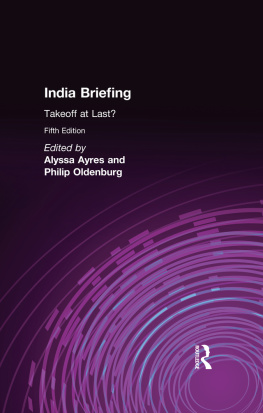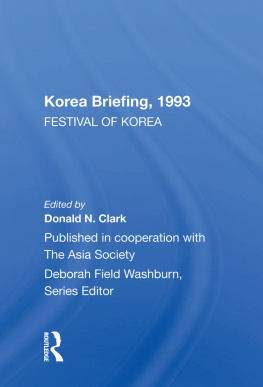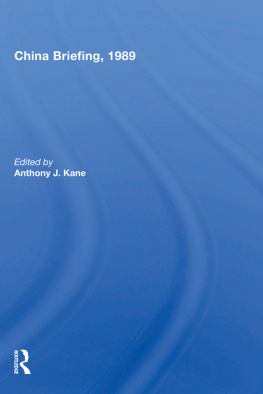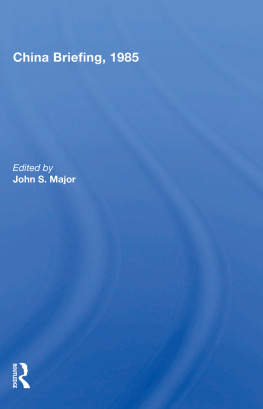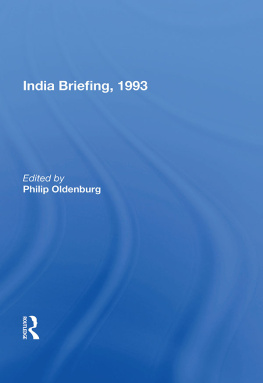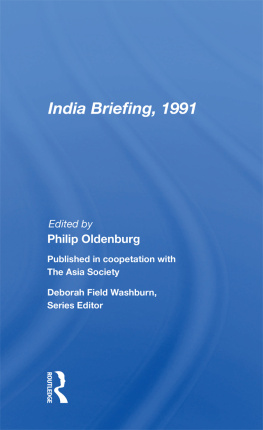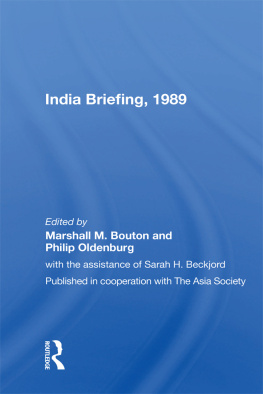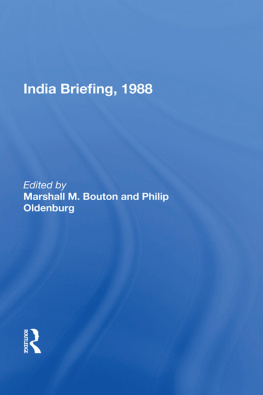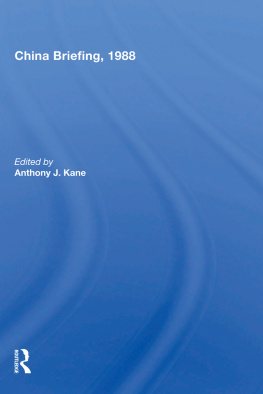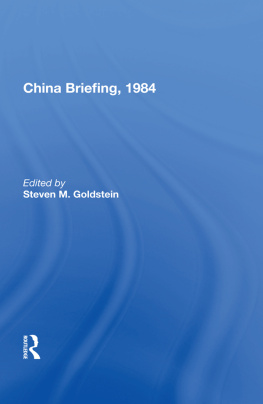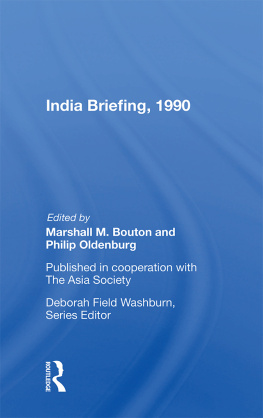India Briefing - India Briefing
Here you can read online India Briefing - India Briefing full text of the book (entire story) in english for free. Download pdf and epub, get meaning, cover and reviews about this ebook. publisher: Taylor and Francis, genre: Politics. Description of the work, (preface) as well as reviews are available. Best literature library LitArk.com created for fans of good reading and offers a wide selection of genres:
Romance novel
Science fiction
Adventure
Detective
Science
History
Home and family
Prose
Art
Politics
Computer
Non-fiction
Religion
Business
Children
Humor
Choose a favorite category and find really read worthwhile books. Enjoy immersion in the world of imagination, feel the emotions of the characters or learn something new for yourself, make an fascinating discovery.
- Book:India Briefing
- Author:
- Publisher:Taylor and Francis
- Genre:
- Rating:3 / 5
- Favourites:Add to favourites
- Your mark:
- 60
- 1
- 2
- 3
- 4
- 5
India Briefing: summary, description and annotation
We offer to read an annotation, description, summary or preface (depends on what the author of the book "India Briefing" wrote himself). If you haven't found the necessary information about the book — write in the comments, we will try to find it.
India Briefing — read online for free the complete book (whole text) full work
Below is the text of the book, divided by pages. System saving the place of the last page read, allows you to conveniently read the book "India Briefing" online for free, without having to search again every time where you left off. Put a bookmark, and you can go to the page where you finished reading at any time.
Font size:
Interval:
Bookmark:

INDIA BRIEFING
 Asia Society
Asia Society
Asia Society is a nonprofit, nonpartisan public education organization dedicated to increasing American understanding of Asia and broadening the dialogue between Americans and Asians. Through its programs in policy and business, the fine and performing arts, and elementary and secondary education, the Society reaches audiences across the United States and works closely with colleagues in Asia.
The views expressed in this publication are those of the individual contributors.
Quickening the Pace of Change
Alyssa Ayres and Philip Oldenburg
Editors
Published in Cooperation with the Asia Society
AN EAST GATE BOOK


An East Gate Book
First published 2002 by M.E. Sharpe
Published 2015 by Routledge
2 Park Square, Milton Park, Abingdon, Oxon OX14 4RN
711 Third Avenue, New York, NY 10017, USA
Routledge is an imprint of the Taylor & Francis Group, an informa business
Copyright 2002 Taylor & Francis. All rights reserved.
No part of this book may be reprinted or reproduced or utilised in any form or by any electronic, mechanical, or other means, now known or hereafter invented, including photocopying and recording, or in any information storage or retrieval system, without permission in writing from the publishers.
Notices
No responsibility is assumed by the publisher for any injury and/or damage to persons or property as a matter of products liability, negligence or otherwise or from any use of operation of any methods, products, instructions or ideas contained in the material herein.
Practitioners and researchers must always rely on their own experience and knowledge in evaluating and using any information, methods, compounds, or experiments described herein. In using such information or methods they should be mindful of their own safety and the safety of others, including parties for whom they have a professional responsibility.
Product or corporate names may be trademarks or registered trademarks, and are used only for identification and explanation without intent to infringe.
Library of Congress Cataloging-in-Publication Data
Library of Congress ISSN: 0894-5136
ISBN 0-7656-0812-X (hardcover)
ISBN 0-7656-0813-8 (paperback)
ISBN 13: 9780765615930 (pbk)
ISBN 13: 9780765615923 (hbk)
| Alyssa Ayres |
| John Echeverri-Gent |
| Joydeep Mukherji |
| Sadanand Dhurrie |
| Christophe Jaffrelot |
| Mark Nichter and David Van Sickle |
| Alok Rai |
| Bonditci Sijapati |
This edition marks the ninth in our ongoing India Briefing series, one of the several Country Briefing series published by our Policy and Business Programs area. We are very pleased with this volumes range of issues, and especially with the fine essays written with care by our contributing authors.
Producing briefing volumes like this one requires a mysterious blend of regional knowledge, administrative tenacity, business sense, and ability to work well under pressure. Asia Society has been fortunate to find such a blend in the editorial partnership of Philip Oldenburg and Alyssa Ayres. Their efforts over the course of the last fourteen monthsworking late nights and during vacations, and on top of a whole host of other projectsbrought this volume out in a timely fashion. But they could not have done anything without the commitment and good spirit of the chapter authorsJohn Echeverri-Gent, Joydeep Mukherji, Sadanand Dhume, Christophe Jaffrelot, Mark Nichter, David Van Sickle, Alok Rai, and Bandita Sijapatiwho cheerfully tolerated Asia Societys rather involved editorial style and produced such high-caliber chapters under tight deadlines.
Asia Society would also like to thank Lisa J. Hacken, whose watchful eyes and steady hands steered the volume from manuscript through production, and Patricia Farr and Chris Reeves, who carefully copyedited the entire volume. Thanks go also to Sanjeev M. Sherchan of Asia Society, who provided support throughout the year of this volumes production.
This is Asia Societys fourth India Briefing published in collaboration with M.E. Sharpes East Gate Books imprint, and we are again pleased with our partnership with Douglas Merwin, Patricia Loo, and Angela Piliouras.
No part of this volume would have been possible without the GE Funds generous contribution. This is the second India Briefing that has benefited from the GE Funds support, and we are most grateful to R. Michael Gadbaw and Scott Bayman of the General Electric Company for encouraging us to continue with this edition of India Briefing and to Evelyn Taylor of the GE Fund for providing the means for us to educate Americans about the important and fundamental changes taking place in Indiachanges that affect the United States as well. Educating Americans about Asia is, after all, the core mission of Asia Society, and we hope that this volume does its small part toward fulfilling that goal.
Finally, this edition of India Briefing coincides with the departure of Marshall M. Bouton, former executive vice president of Asia Society and the founding editor of the India Briefing series as well as Asia Societys resident South Asia expert for over twenty years. Dr. Bouton assumed the presidency of the Chicago Council on Foreign Relations in August 2001. We are sure he will do much to enrich that institution, as he has done at Asia Society.
We welcome reader comments and suggestions via e-mail: policy@asiasoc.org.

| Nicholas Platt President Asia Society | Robert W. Radtke Vice President, Policy and Business Programs Asia Society |
This edition of India Briefing was already into production prior to the events of September 11, 2001. We are acutely aware that some of its contents may appear dated in light of the tragedy and its aftermath, but we believe that no major argument in any chapter requires revision.
The latter section of the Introduction to this volume focuses on the development of closer U.S.-India relations over the course of 1998 2001. At the time of this writing, Indian public opinion was beginning to turn against the United States partnership with Pakistan in the military campaign in Afghanistan. From the Indian perspective, the global goals motivating U.S. policy, this time a war on terrorism, threatened to overshadow a nascent U.S. sensitivity to Indian concerns.
It will not be easy for the United States to resume a quasi-alliance with Pakistan while simultaneously improving relations with India. If the war on terrorism can, through quiet diplomacy, bring about a decline in cross-border violence in Kashmir, then the United States. stands a better chance of being seen by India as holding a principled stance against terrorism wherever it occurs. There is no reason to believe that trade concessions for Pakistan will take place at Indias expense; the opportunities for broadening the U.S.-India economic relationship are still plentiful. Yet the specter of tilts haunts this moment. The economic support package negotiated for Pakistan is being viewed in India as a reward rather than necessary assistance from the United States to help Pakistan achieve goals impossible without further economic aid. Should Indian policymakers continue to view these actions as rewarding Pakistan and by extension, punishing India, the U.S.-India relationship will sufferregardless of U.S. intentions to forge relationships with India and Pakistan on their own merits, and outside a zero-sum game framework.
Font size:
Interval:
Bookmark:
Similar books «India Briefing»
Look at similar books to India Briefing. We have selected literature similar in name and meaning in the hope of providing readers with more options to find new, interesting, not yet read works.
Discussion, reviews of the book India Briefing and just readers' own opinions. Leave your comments, write what you think about the work, its meaning or the main characters. Specify what exactly you liked and what you didn't like, and why you think so.

